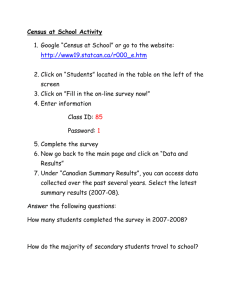Geneva, 30 October 2009
advertisement
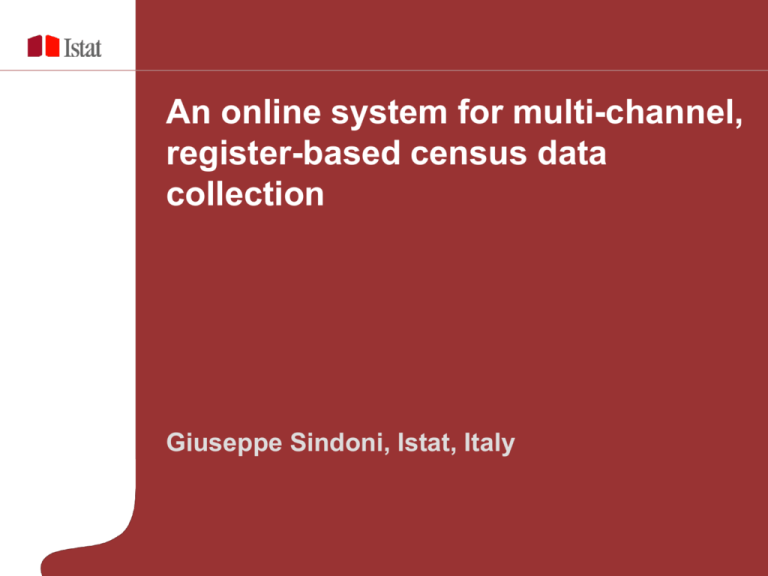
Geneva, 30 October 2009 An online system for multi-channel, register-based census data collection Giuseppe Sindoni, Istat, Italy Geneva, 30 October 2009 Italian Census 2011: organization context • European regulation – N. 763/2008, 09/07/2008 • Variables and classifications • Deadline for data delivery: 1 April 2014 Geneva, 30 October 2009 What’s new for the 2011 Population Census? •Use of street numbers in field operations •Business and household geocoding to the census tract •Use of administrative archives •New questionnaire delivery process •Personalised questionnaires •Mail out •New methods and survey techniques •Census areas •Short and long form •Multi-channel collection •Flexible organisation network •Downsized municipal front-office => Stronger back-office •Population-based differentiation •Enumerator guidance Geneva, 30 October 2009 Census pilot • • • • • • Started 25 October 2009 Stratified sample 31 municipalities About 80,000 households About 195,000 people 6 survey schemes to be tested on different types of municipalities Geneva, 30 October 2009 This presentation • Architecture of the web-based collection and management system • Technical characteristics • The online questionnaire • The Census Management System Geneva, 30 October 2009 System architecture Geneva, 30 October 2009 On line questionnaire: main features • Generalized system for questionnaire structure definition • Web application framework • Implements rule-based validation, both client and server side • Java script and server-side based customization • Platform independent Geneva, 30 October 2009 The management and monitoring system • Aimed at simplifying back-office work • Needed to: – manage the day-to-day work of enumerators – monitor multi-channel data collection Geneva, 30 October 2009 Management system: access modes • Access through a web site • Access management allows to define user profiles with authorizations depending on user tasks, also by territorial level • Each user will be given a role, that is a set of allowed functions Geneva, 30 October 2009 Management system: users • ISTAT: Central and Regional officers • Census organizations: Municipal Census Back Office, coordinators and enumerators • Other organizations: e.g. the company in charge of printing and mailing questionnaires Geneva, 30 October 2009 Management and monitoring system: main functions • • • • • Census tract status Summary reports Operator management Questionnaire management Documentation Geneva, 30 October 2009 Geneva, 30 October 2009 Technical features • Three layer architecture – RDBMS - application server browser • Model-View-Controller pattern • Java Enterprise Edition 5 – Servlet + Java Server Pages Geneva, 30 October 2009 Final thoughts •Very difficult to assess the right usability issues for the questionnaire •The pilot will probably provide a lot of feedback on user satisfaction, from both households and municipal back offices Geneva, 30 October 2009 Generalized system for questionnaire structure definition • Desktop application – Interactive editor for section structure, questions and fields – Prerequisite: DB to store microdata • Automatic generation of – JSP pages – .jar package Geneva, 30 October 2009 Web application framework • Basic functions to run an on line questionnaire – User interaction flow control – Validation rule configuration – Validation rule execution – DB interaction Geneva, 30 October 2009 Rule-based validation • Basic validation – Field format – Mandatory fields • “Business” rules – Range checks – Inter-field logical rules • Client-side validation based on Javascript • If JS disabled -> server-side validation Geneva, 30 October 2009 Customization • Java script and server-side based customization – JSP pages can be customized client-side – New modules can be added to the web framework Geneva, 30 October 2009 Platform independence • Based on Java and relational technologies • Runs on any platform where the Tomcat application server is available Geneva, 30 October 2009 Management system: operator management The following functions are provided: •Adding and modifying personal information of municipal enumerators and coordinators •Assignment of census tracts to enumerators •Assignment of enumerators to coordinators •Assignment of roles to operators •Monitoring operators’ activity •Account management Municipal Census Office supervisors can autonomously organize their work Geneva, 30 October 2009 Management system: operator management ISTAT will provide Municipal Offices with the supervisor/s accounts, which will be enabled to all operator management functions Each account will be linked to an individual operator Geneva, 30 October 2009 Management system: census tract status The following functions are available: • Census tract journal visualization and printing • Census tract journal update • Auxiliary form visualization • Auxiliary form update Enumerators’ daily work can be guided and targeted through census tract status control. Geneva, 30 October 2009 Management system: summary reports The following functions are provided: • Visualization of summary reports on collection progress at the census tract level of detail • Monitoring multi-channel collection • Visualization of aggregated data on collection results Geneva, 30 October 2009 Management system: questionnaire management The following functions are provided: • Personal data change visualization • Individual questionnaire visualization • Questionnaire or additional individual form print • Postal reception registration • Monitoring postal delivery status Management system: on line documentation Geneva, 30 October 2009 The following documents will be available: • Survey instructions • User manual • FAQ • Training materials • ...
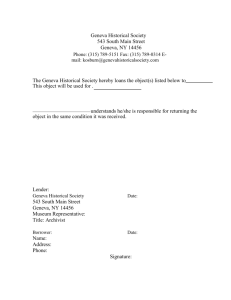
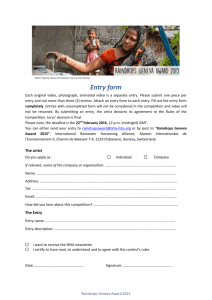
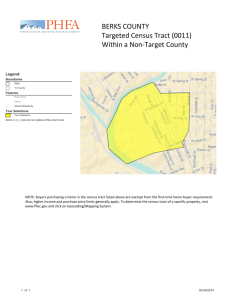
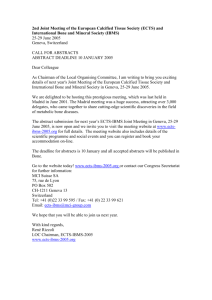
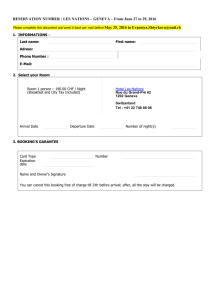
![Invitation [word format]](http://s3.studylib.net/store/data/007096478_1-54334bf5ab877bf1ebd233e686a3f8bb-300x300.png)
